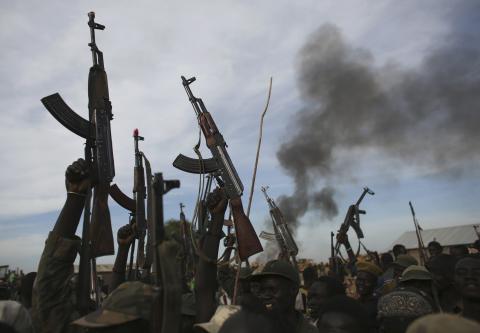Advertisement
South Sudan Oil State Capital Divided, Crude Output Down
JUBA (Reuters) - The capital of South Sudan's main oil-producing region was divided between the army and rebels on Thursday after the worst fighting since a January ceasefire stoked jitters in global
oil markets.
The Juba government said it remained committed to peace talks but that it had to react after rebels allied to former vice president Riek Machar on Tuesday attacked Malakal, which lies on the edge of Upper Nile state's oil fields.
A petroleum ministry official told Reuters oil production had fallen to about 170,000 barrels per day even before the rebel strike on Malakal, a fall of around a third.
"The reduction has nothing to do with the fighting but more (to do with) technical issues," the official said, speaking on condition of anonymity.
"We have had to rely on river transport for technical equipment for the last two months and you cannot guarantee safety on that channel," he said.
Even so, the attack on Malakal raises concerns over the security of South Sudan's northern oil wells - an economic lifeline for Juba and also neighboring Sudan, which earns vital hard currency from fees received for use of its oil pipeline.
International pressure is mounting on the warring factions to return to negotiations, although Western diplomats say in private that mutual recriminations over ceasefire violations raise questions about each side's commitment to talks.
"Malakal is not yet fully calm ... There are pockets of resistance within the town. It is split between the two sides," South Sudan's Information Minister Michael Makuei told Reuters in Ethiopia, where East African states are trying to broker a second round of peace talks.
Upper Nile is the only state pumping oil after production in neighboring Unity state was halted earlier in the conflict, a suspension which had already forced the government to cut output by about a fifth to around 200,000 bpd.
"SPOILT CHILD"
The petroleum official told Reuters 167,367 barrels were pumped on Monday and 168,403 on Tuesday, the day rebels struck Malakal. Those levels could fall further if fighting extends into Upper Nile's oil fields, oil industry observers say.
Malakal, a dusty market town on the banks of the White Nile, lies about 140 km (90 miles) from an oil complex where a key crude processing facility is situated.
Global oil prices have been supported in the past two days in part because of the conflict in South Sudan.
Thousands of people have been killed and more than 800,000 have fled their homes since fighting began two months ago, triggered by a power struggle between President Salva Kiir and Machar, his former deputy whom he sacked in July.
Minister Makuei told Reuters the government still sought a peaceful resolution to the crisis and would "continue talking despite the aggressive and intolerable (ceasefire) violations".
Diplomats say the latest violence has cast doubts over the peace talks which have already been delayed by rebel demands for the release of four remaining political detainees and the withdrawal of Ugandan troops from the country.
The Juba government says it is frustrated that the international community has not been harder in its criticism of the rebels following the assault on Malakal.
"How long will these rebels continue to act as the spoilt child of the international community?" presidential spokesman Ateny Wek Ateny said.
The United States said on Wednesday it was deeply concerned by the fighting in and around Malakal, which it called a blatant violation of the cessation of hostilities agreement.
The government has accused the rebels of receiving support from outside, but has not publicly identified the source it believes has assisted the rebel forces.
Lul Ruai Koang, spokesman on military affairs for Machar's delegation at the talks in Ethiopia, denied the government claims that the rebels were receiving support from outside.
"It is a lie. We are not being supported by anyone from outside. We are on our own," he said in Addis Ababa. "They are making these wild allegations because they are not winning."
(Additional reporting by Lesley Wroughton in Washington and Aaron Maasho in Addis Ababa; Writing by Richard Lough; Editing by Jon Boyle and Gareth Jones)



















Add new comment